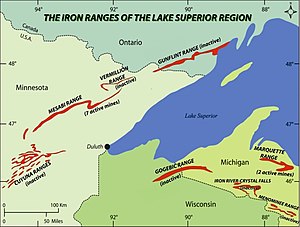Marquette Iron Range: Difference between revisions
→References: added links |
One of two iron active ranges (see map) |
||
| Line 1: | Line 1: | ||
{{refimprove|date=April 2009}} |
{{refimprove|date=April 2009}} |
||
[[File:Iron Ranges.jpg|thumb|300px]]Lake Superior Iron Ranges]] |
[[File:Iron Ranges.jpg|thumb|300px]]Lake Superior Iron Ranges]] |
||
The '''Marquette Iron Range''' is a deposit of [[iron ore]] located in [[Marquette County, Michigan]], largely in and around the towns of [[Ishpeming, Michigan|Ishpeming]] and [[Negaunee, Michigan|Negaunee]]. |
The '''Marquette Iron Range''' is a deposit of [[iron ore]] located in [[Marquette County, Michigan]], largely in and around the towns of [[Ishpeming, Michigan|Ishpeming]] and [[Negaunee, Michigan|Negaunee]]. A smaller counterpart of Minnesota's [[Mesabi Range]], it is one of two iron ranges in the [[Lake Superior]] basin that are in active production as of 2015. The iron ore of the Marquette Range has been mined continuously from 1847 until the present day. '''Marquette Iron Range''' is the deposit's popular and commercial name; it is also known to geologists as the ''Negaunee Iron Formation''. |
||
==History== |
==History== |
||
Revision as of 16:16, 23 March 2015
This article needs additional citations for verification. (April 2009) |

Lake Superior Iron Ranges]]
The Marquette Iron Range is a deposit of iron ore located in Marquette County, Michigan, largely in and around the towns of Ishpeming and Negaunee. A smaller counterpart of Minnesota's Mesabi Range, it is one of two iron ranges in the Lake Superior basin that are in active production as of 2015. The iron ore of the Marquette Range has been mined continuously from 1847 until the present day. Marquette Iron Range is the deposit's popular and commercial name; it is also known to geologists as the Negaunee Iron Formation.
History
The Marquette Iron Range was discovered in 1844 by a party of surveyors led by William A. Burt, who found that their sensitive magnetic compasses produced skewed results because of the concentration of iron in the land they were surveying. Mining began in 1847. At first, the hematite iron ore of the Marquette Range was smelted with local charcoal into pig iron, but after the opening of the first Soo Canal in 1855 the iron ore itself began to be shipped down the Great Lakes from the newly developed port city of Marquette.[1]
Capitalists from Cleveland played a key role in the development of the Marquette Iron Range, and the Cleveland-Cliffs Iron Company had acquired a controlling influence on the Range by 1890.
The iron range today

As of 2009, the Cleveland-Cliffs' Empire Mine and Tilden Mine continue to produce iron ore from the Marquette Range. Cleveland-Cliffs ships the ore by a wholly owned short-line railroad, the Lake Superior and Ishpeming, to Marquette for transport by lake freighter to steel mills in the lower Great Lakes.
The Marquette Iron Range became a Michigan registered historic site in 1957 as S-0035.[1] The Cliffs Shaft Mine Museum in Ishpeming celebrates the history of the iron ore deposit and its miners.
See Also
- Mesabi Range
- Gogebic Range
- Cuyuna Range
- Vermilion Range (Minnesota)
- Gunflint Range
- Iron Mountain Central Historic District
References
- ^ a b "Marquette Iron Range". Michigan Department of History, Arts and Libraries. Retrieved 2008-10-10.
